Who actually makes Hakushika Sake?
In today's technically-advanced society, we take for granted many of the products we buy. Imagining that most everything is made by machine, we rarely think of those who might be involved in the production of a product.
With Hakushika Sake, however, it is clearly the people at Tatsuuma-Honke Brewing Company who are responsible for brewing delicious sake and maintaining strict quality standards. Although some parts of the processes may be partially mechanized (such as bottling), in the end, it is the people who may be credited for a delicious brew.
Introducing some of those at Hakushika who help maintain our history of delicious, quality sake:
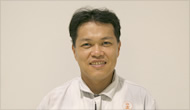
Name: Yosh (which also means "Let's Go!!")
Position: I am the manager of the Brewing Department so my work encompasses a lot of areas from ingredient procurement to the actual fermentation process. My most important work now, however, may be my involvement with making the koji (malted rice) which is a significantly important step in the sake fermentation process.
What do you find interesting about your work?
For one thing, because I formerly worked with product development in the Research Department, I now have both theoretical as well as practical experience under my belt which makes my work all the more interesting. For another thing, I have such a feeling of satisfaction when I taste a new batch of sake and find that it tastes so delicious. It's a wonderful feeling!

Why did you decide to work with Hakushika Sake?
When I was at university, I was involved with a research project on the types of yeast best suitable for sake brewing. From that time on, I have been very interested in sake-making.
What kind of sake do you like?
I typically like a slightly sweet sake with a good balance. I also like ginjo sake very much because of its abundance of fragrance. I am especially a fan of our Kijuro brand tokubetsu honjozo sake for its very distinctive taste.
What do you think is important to make good sake?
Most certainly, the human senses of taste, smell, sight and also touch are incredibly important to fine sake making. Sake making should not be left only to machines to do. In the end, it is a person who must evaluate the quality of sake.What's your hobby?
I love traveling both in Japan and abroad. I also like keeping fit and very much enjoy marathons and triathlons.
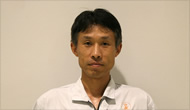
Name: Jun'ya
Position: I'm in charge of making sure we have and develop the right kind of yeast kobo for the fermentation process. Without the right yeast to change the sugars produced in the malted rice into alcohol, we could not produce sake. In order to produce the yeast we need for brewing, I must carefully maintain the temperature control of the yeast propagating process.
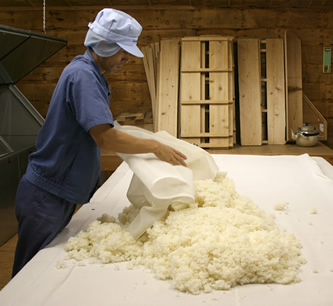
What do you find interesting about your work?
I think it's amazing that depending upon the yeast quality, even with the same ingredients of rice and water you can develop totally different kinds of sake. Even now, I find that the natural process of fermentation is endlessly interesting. My job is to provide and maintain the proper conditions in which the yeast can work as effectively as possible.
Why did you decide to work with Hakushika Sake?
I used to watch my father enjoy sake and was especially fascinated by the way his atsukan (warm sake) was prepared. He didn't use a microwave to warm it up but rather a kind of small aluminum pitcher which would be placed in hot water which would slowly and gently warm the sake. From this too, I developed an interest in sake, not only for its taste but also the various manners in which to enjoy it.
What kind of sake do you like?
I like the premium honjozo and tokusen sake types but also like the everyday futsushu type as well. I like a pure sake without an overly complicated taste. My favorite matchings with food include such traditional favorites as cold tofu or kamaboko (fish cake) but I also like it with almond-seasoned cheese as well.
What do you think is important to make good sake?
In my work, I see that the roles of developing good koji (malted rice) and kobo (yeast) are critical for making good sake. The koji converts the starch naturally present in the rice into sugars and the yeast converts those sugars into alcohol.
What's your hobby?
I enjoy bike riding.

Name: Mitsuhide
Position: I am currently in charge of making shubo which is the yeast starter mix necessary for the fermentation of rice into sake. I've worked in other departments before so I now understand how important my work is in the entire process of making sake.
What do you find interesting about your work?
There are so many different kinds of yeasts and shubo so you need to use the proper one depending upon the characteristic of the sake. Much of what you can tell about the quality of the finished product comes from the proper use of yeast in sake brewing.
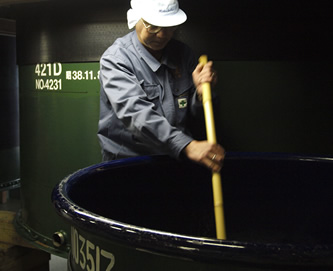
Why did you decide to work with Hakushika Sake?
I've always been impressed with the traditions of Japan as well as growing things whether as crops or as personal gardens. I had the good fortune of meeting a good councilor in school who recommended the Tatsuuma-Honke Brewing Company. I came here as a student on a sort of field trip and liked what I saw so here I am today!
What kind of sake do you like?
I like many kinds of traditional sakes: kasen, josen, tokusen… I sense a kind of alcohol feeling with warmed sake (atsukan) so when I enjoy sake, I often like it chilled (hiya). One of my favorite pairings is junmai sake with lightly-salted edamame or a local special black bean called Tamba kuromame.
What do you think is important to make good sake?
I have gained a lot of understanding from watching the toji (sake brewmasters). From this, I have learned that one of the keys to making sake is to think about the next step while doing the current step perfectly.
What's your hobby?
I'm a great fan of classic guitar, especially Bach, but I also have a deep love for sakauta, the traditional work songs created centuries ago of the sakagura (sake breweries). The sakauta of the Tamba Toji of Hyogo Prefecture are especially renowned. I enjoy participating in local events to keep this tradition alive.

Name: Satoshi
Position: I am in charge of what we call "pressing the moromi." The moromi is what you get after the rice, koji (malt) and kobo (yeast) have finished their fermentation work. Moromi is milky and thick because it still contains pieces of rice. I operate the pressing machine which separates the solid mass known as sake kasu from the liquid which later becomes the sake you see in stores and restaurants.
What do you find interesting about your work?
I'm particularly fascinated about the way in which temperature control can make or break a sake brew. We tend to like doing things at lower temperatures. It might take longer and more effort but you can yield better results. I am also interested in the fact that to make sake, you must do the correct thing exactly at the right time. This is not only science, this is also know-how and experience.

Why did you decide to work with Hakushika Sake?
I was interested in the process of fermentation as a student. Working with sake was not only an obvious choice but also an interesting one as well!
What kind of sake do you like?
I rather like honjozo sake made with the premium rice from Hyogo called Yamadanishiki. I enjoy it with my dinner or just a bit before resting in the evening.
What do you think is important to make good sake?
Well, of course you must have good ingredients: excellent water and rice in particular. However, even with good ingredients you cannot make a fine sake without personal knowledge and experience, technique and the appropriate equipment.
What's your hobby?
I enjoy going out for drives. I also enjoy raising a very traditional sort of Japanese pet which is suitable for small homes, the beetle (particularly the large variety known as Okuwagata).

Name: Takashi
Position: I'm in charge of the pasteurization process.
What do you find interesting about your work?
Making sake has a sense of "completion." At the end of the brewing process, you know you have created something good.
Why did you decide to work with Hakushika Sake?
At a young age, I knew I was more interested in traditional things rather than the latest things. A wonderful teacher of mine saw this in me and recommended considering working at Tatsuuma-Honke Brewing Co. After so many years, I am still here and still enjoy what I do!
What kind of sake do you like?
My favorite is a standard kasen-style sake. I enjoy drinking it chilled, especially with sukiyaki or peanuts!
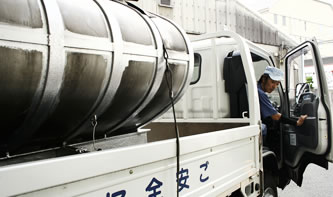
What do you think is important to make good sake?
Keeping things clean! You can make the most delicious sake in the world but unless you keep the work area clean and sanitized, your good work becomes meaningless.
What's your hobby?
I enjoy just relaxing with a nice glass of sake!

Name: Tadashi
Position: I am responsible for bottling and everything related to this process.
What do you find interesting about your work?
I love working and talking with people. I would definitely say that the communication with my co-workers not only makes the work go smoother, it's also enjoyable.
Why did you decide to work with Hakushika Sake?
My grandfather loved good sake which impressed me as a child. I think coming to work for Hakushika was fate!
What kind of sake do you like?
I like junmai daiginjo types because they feel just slightly sweet and are so pleasant to drink.

What do you think is important to make good sake?
In my line of work, I see that temperature control is extremely important. It's also so important to make certain that the bottling process is done in a very clean environment. That's why we work so hard here to keep our sanitation standards at the highest level.
What's your hobby?
I've been enjoying the sport of baseball for over 20 years now.

Name: Takeshi
Position: I am responsible for bottling as well as repair and maintenance of the equipment.
What do you find interesting about your work?
I really enjoy working with machines and fine-tuning the equipment to make the bottling process as efficient as possible. When our new bottling facility opened last year (2010), I was especially busy figuring out all of the new equipment.
Why did you decide to work with Hakushika Sake?
I have a soft spot in my heart for traditional Japan so working with sake is a perfect match for me.
What kind of sake do you like?
I like dry sake like our product Chokara. I also enjoy our tokubetsu honjozo sake made with the yamadanishiki sake rice.

What do you think is important to make good sake?
Since I am responsible for the bottling part of making sake, I would most definitely say that cleanliness, sanitation, and organization are all very important. It's amazing how many things are necessary to make delicious sake products!
What's your hobby?
I'm a big fan of golf.
